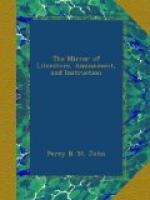Cuddy was now wide awake, and felt, when he got up, his joints sadly cramped, which it was only natural they should be, considering the hard texture of the stone, and the depth his knees had sunk into it. The great difficulty was, to explain how, in one night, summer had become winter— whole woods had been cut down, and well-grown trees had sprouted up. The miracle, nothing else could he conclude it to be, urged him to hasten his return to Innisfallen, where he might learn some explanation of these marvellous events.
Seeing a boat moored within reach of the shore, he delayed not, in the midst of such wonders, to seek his own bark, but, seizing the oars, pulled stoutly towards the island; and here new wonders awaited him.
Father Cuddy waddled, as fast as cramped limbs could carry his rotund corporation, to the gate of the monastery, where he loudly demanded admittance.
“Holloa! whence come you, master monk, and what’s your business?” demanded a stranger who occupied the porter’s place.
“Business—my business!” repeated the confounded Cuddy, “why do you not know me? Has the wine arrived safely?”
“Hence, fellow,” said the porter’s representative in a surly tone, “nor think to impose on me with your monkish tales.”
“Fellow!” exclaimed the father, “mercy upon us that I should be so spoken to at the gate of my own house! Scoundrel!” cried Cuddy, raising his voice, “do you not see my garb—my holy garb?—”
“Aye, fellow,” replied he of the keys, “the garb of laziness and filthy debauchery, which has been expelled from out these walls. Know you not, idle knave, of the suppression of this nest of superstition, and that the abbey lands and possessions were granted in August last to Master Robert Collan, by our Lady Elizabeth, sovereign queen of England, and paragon of all beauty, whom God preserve!”
“Queen of England,” said Cuddy; “there never was a sovereign queen of England; this is but a piece with the rest. I saw how it was going with the stars last night—the world’s turned upside down. But surely this is Innisfallen island, and I am the Father Cuddy who yesterday morning went over to the abbey of Irelagh respecting the tun of wine. Do you know me now?”
“Know you! how should I know you?” said the keeper of the abbey; “yet true it is, that I have heard my grandmother, whose mother remembered the man, often speak of the fat Father Cuddy of Innisfallen, who made a profane and godless ballad in praise of fried eggs, of which he and his vile crew knew more than they did of the word of God, and who, being drunk, it was said, tumbled into the lake one night and was drowned; but that must have been a hundred, aye, more than a hundred years since.”




